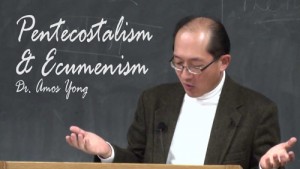Pentecostalism and Ecumenism: Past, Present, and Future (Part 5 of 5) by Amos Yong
Amos Yong challenges classical Pentecostals to re-examine what ecumenism really is.
V. Pentecostalism and Ecumenism: Future Prospects and Tasks
My conclusion is that Pentecostals need the larger Church even as the larger Church needs Pentecostalism. Thus, the quest for a biblically based and Spirit inspired Christian unity must include both movements. In this last section of my five-part article, I want to briefly discuss the various levels of ecumenical activity and make some practical suggestions with regard to how Pentecostals can become more ecumenically conscious and involved.
Levels of ecumenism
There is no one correct way to either be ecumenical or to do ecumenism. In fact, although I present four levels of ecumenical activity here, it is difficult to say where one stops and the other starts. I would surmise that wherever genuine ecumenism occurs, it will include theological and doctrinal discussion (academic ecumenism), the development of interpersonal relationships between clergy across denominational lines (church leadership ecumenism) and between the laity at large (neighborhood ecumenism), and social action of some type (institutional-denominational ecumenism).22 If we keep in mind the artificial boundaries between each level, the following is designed to provide an overview of what ecumenism-in-action looks like.
Academic ecumenism usually involves teachers, professors, and those with advanced training in biblical and theological studies. At this level, the goals of ecumenical discussion include the clearing away of stereotypes, the development of mutual understanding, and, the clarification of actual problems confronting Christian unity (as opposed to problems that are simply the result of misunderstanding or stereotype). Pentecostal academics who have been involved in these dialogues generally are not denominationally funded since most Pentecostal churches and groups do not place such activity high on their priority list. Thus, along two fronts—financially and with regard to one’s personal reputation—Pentecostals who participate at this level of ecumenism do so at some personal risk. It is therefore not unusual to hear many of them attest that their ecumenical involvement proceeds from a sense of divine calling.
Category: Ministry, Pneuma Review, Winter 2002



